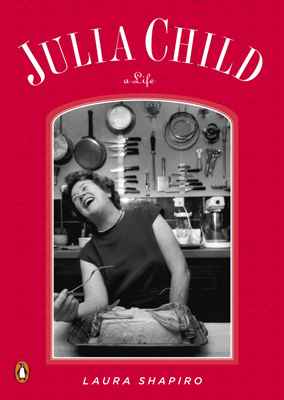
I was more than thrilled to be contacted by Penguin Publishers asking if I wished to receive a copy of Laura Shapiro’s bio of Julia Child to review. I love the perks of food blogging!
Just a caveat: I am probably one of the minority of the food blogging world who hasn’t jumped all over Julie and Julia: The Movie. Every review I read about the movie labeled it as mediocre, and only half worth seeing. Truthfully? I hated the book, finding Julie Powell to be a foul-mouthed, whiny and mean-spirited woman who didn’t really seem to learn all that much about her year of cooking MtAoFC except that there’s a small group of people who enjoy reading profanity laced blog posts. And it just about kills me that this caustic woman has been so readily associated with a woman of Julia Child’s standing. Reading Laura’s book makes me even more chapped about that.
The book is a quick but absorbing read. It’s barely 200 pages even with a prologue and index, and every page leaps with vivid description of the larger than life persona of Julia Child. It takes the reader through her privileged upbringing of a charmed youth, her foray into service for WWII and the subsequent meeting and courtship of Julia and Paul Child. Julia’s spirit shines in every page. Here was a woman who struggled most of her life with defining herself and making life purposeful, yet she never once backed down on her positive and bubbly outlook regardless of the situation. Julia encountered a great deal of backlash in her lifetime, and it never brought her down, never caused her to retaliate and never made her feel like giving up and settling. She strove forward in her quest to introduce real French cuisine to America, a culture that was steeped at the time in foods that often horrified her. The book tallies the enormous task of writing Mastering the Art of French Cooking, and the exhaustive means to which Julia prepared, tested and re-tested every recipe in the book. She fought against the conventions of French cooking, which was mostly done by men and remained firm in her belief that anyone could understand the techniques and methods that many people felt were so steeped in tradition and culture that they remained undefinable. Julia’s sense of cooking was nothing more than understanding the love behind each meal. It was never about showing off or glorifying what was going on in the kitchen; Julia wanted people to know, inherently, what real cooking was all about. It wasn’t just putting a list of ingredients together. It was about knowing what the process was behind the list, the means to bring these items together to make an incredible taste. It was science, technique and above all else, it was love.
The book also fully chronicles the love story between Julia and Paul. Paul Child, the book reiterates, was actually quite unimpressed with Julia when they first met, but as the story progresses, through snippets of letters between Paul and his brother, you see the transformation of a man from indifferent and aloof, to one who falls spellbound in love with her spirit and personality. Theirs is a true partnership and classic romance. He was the solid and dependable force behind The French Chef programs as they aired on television, helping her to create, plan and execute them to the best of her abilities. He tirelessly supported her, held her up and accompanied her through her rise to fame and stardom and was her biggest and most prominent fan, always by her side for media visits, book signings and press tours.
I love a book that leaves me feeling like I’ve just sat down and taken in a long and intimate conversation with someone. I finished the book almost in tears as it discusses first Paul’s failing health and Julia’s anguish at placing him in a nursing home, and then finally, Julia’s physical denouement, the strokes, surgeries and ill health that finally took down the indomitable spirit that was Julia Child. I found particularly touching the passage about Julia’s recovery from knee replacement surgery, and how she was finding it extremely difficult to manage the energy to get to her feet for the required therapy. Her longtime assistant instructed the therapists to bring her into a kitchen and ask her to slice some onions. Once the knife was in Julia’s hand, and the counter in front of her, she rose to her feet and began, in earnest to cut up the onions placed before her, finding the encouragement in her most beloved task to take on the difficult and painful exercises. It’s a rare book that makes me feel lonely when I finish, wanting more of the person so well defined within it’s pages.
For all of her fans, this is an easy and enjoyable read, full of insight to a much beloved culinary icon. I fully related to the sentence that claims there are two kinds of cooks in the world; those who wish to impress and those who just want to feed people. Julia loved feeding people, and cared nothing for impressing anyone. Her ego needed no stroking and she didn’t care much if no one liked what she did. All she wanted was to make them sigh in contentment over the dishes in front of them, and given her legacy, it’s clear that her life was a mission accomplished.